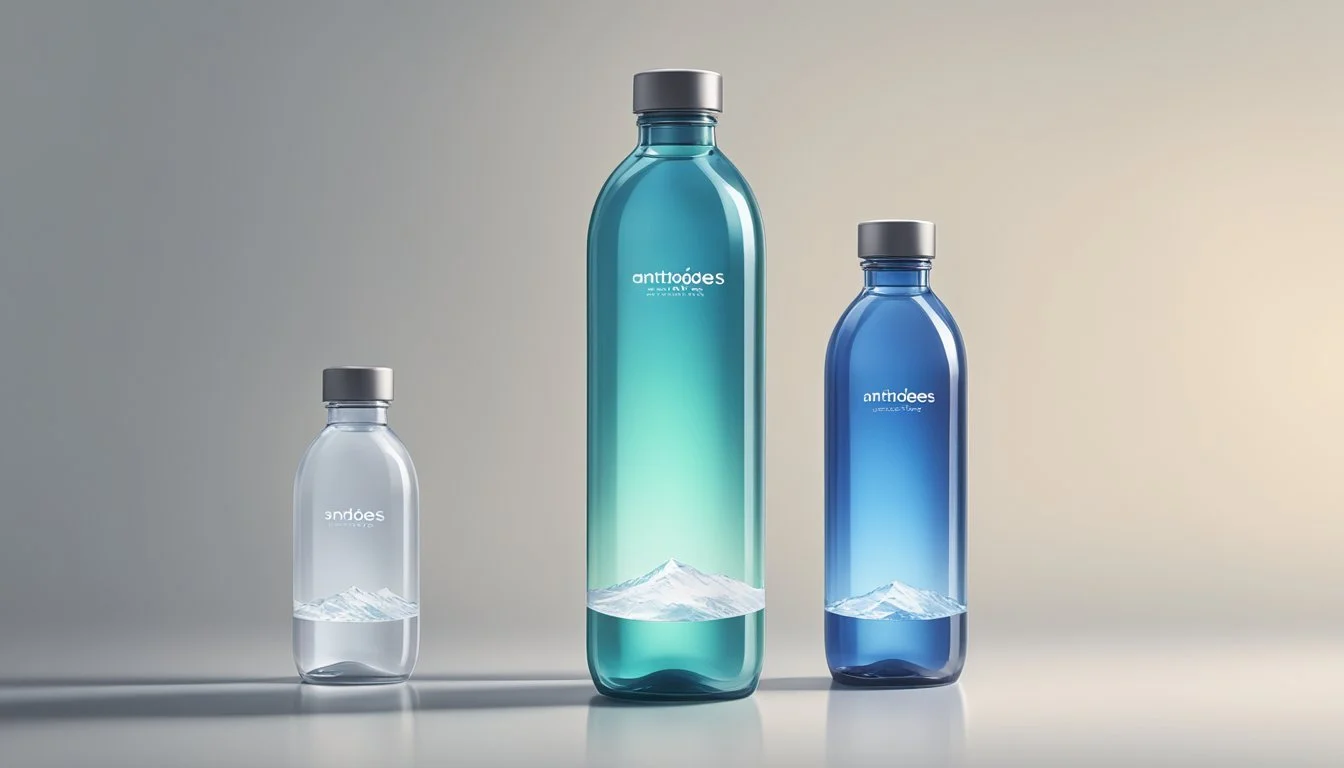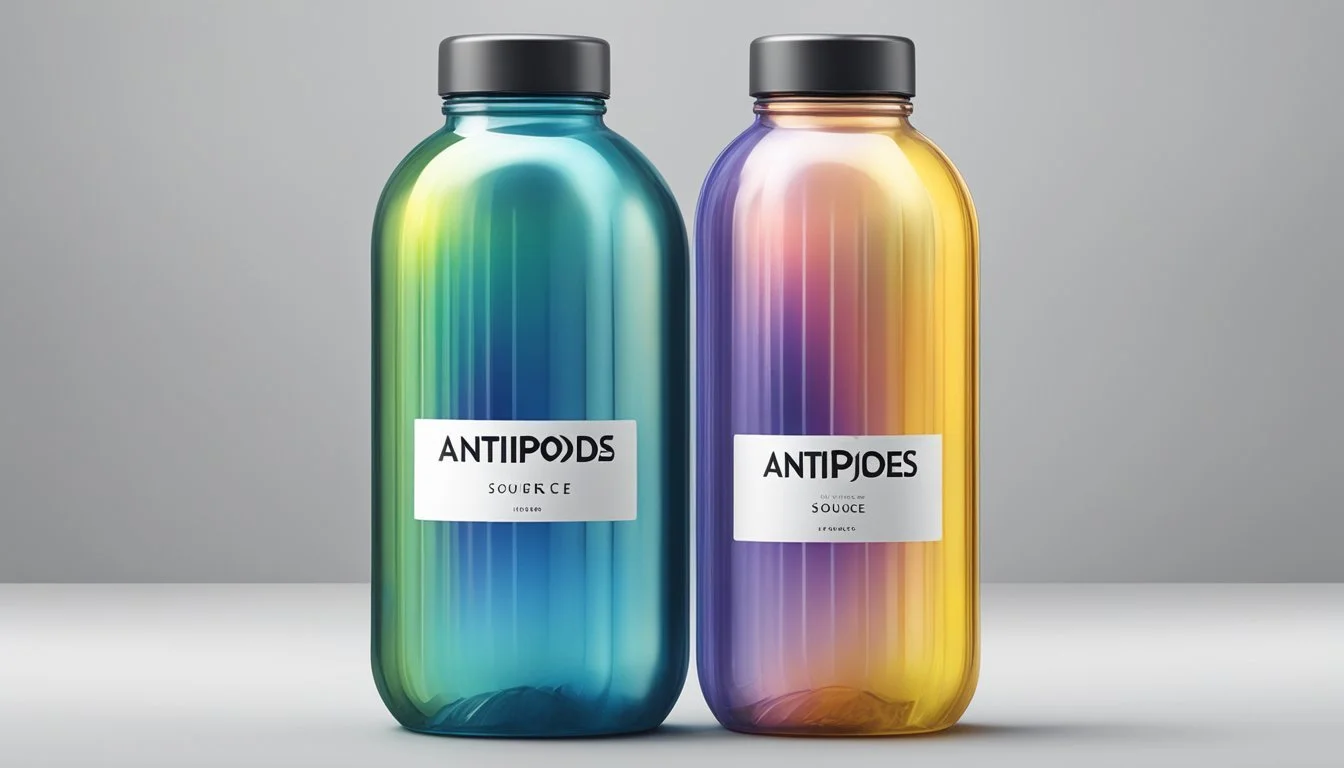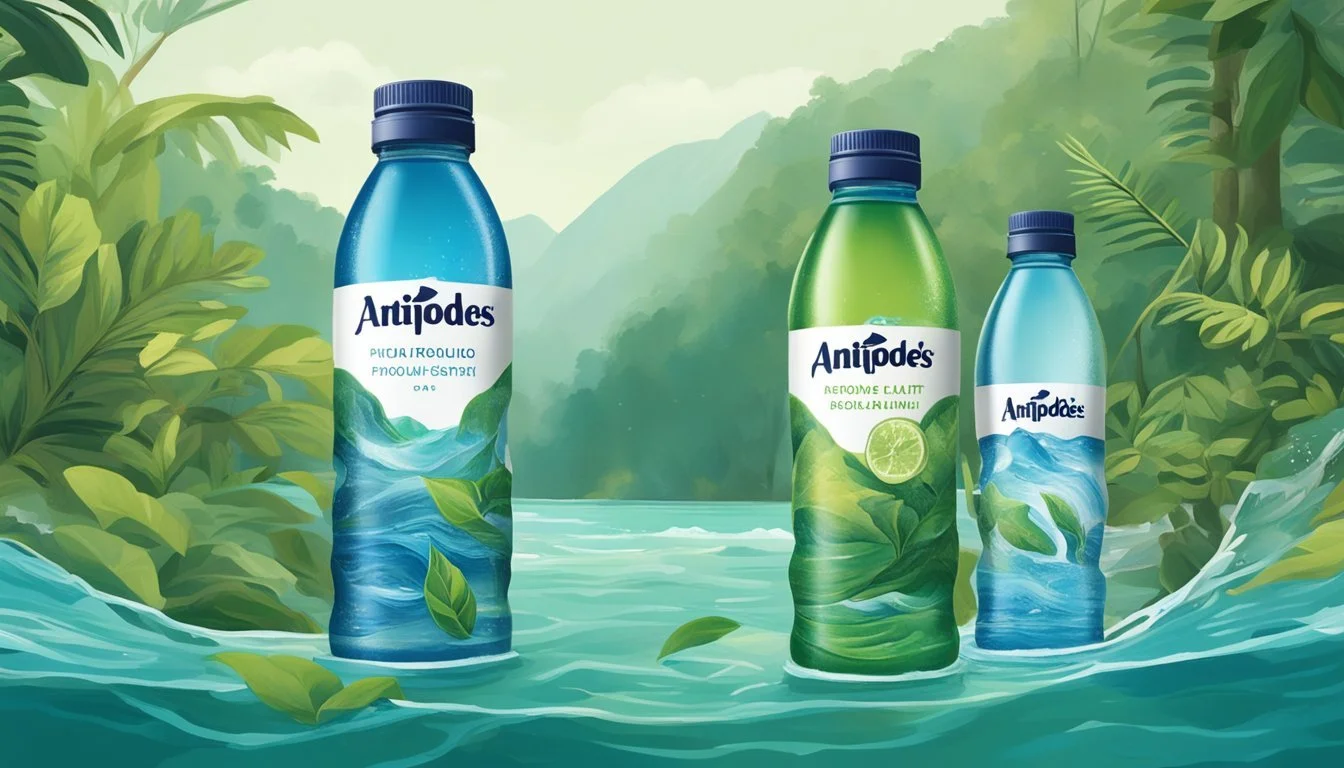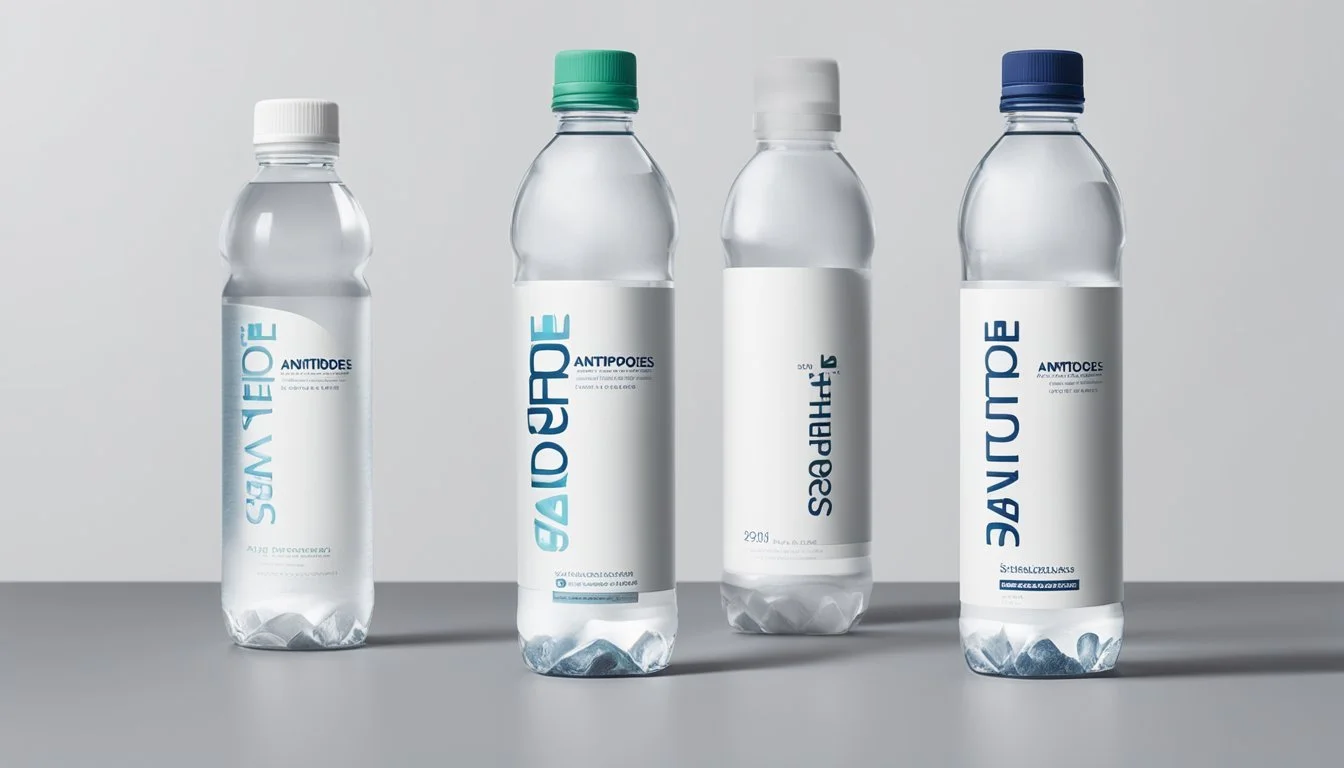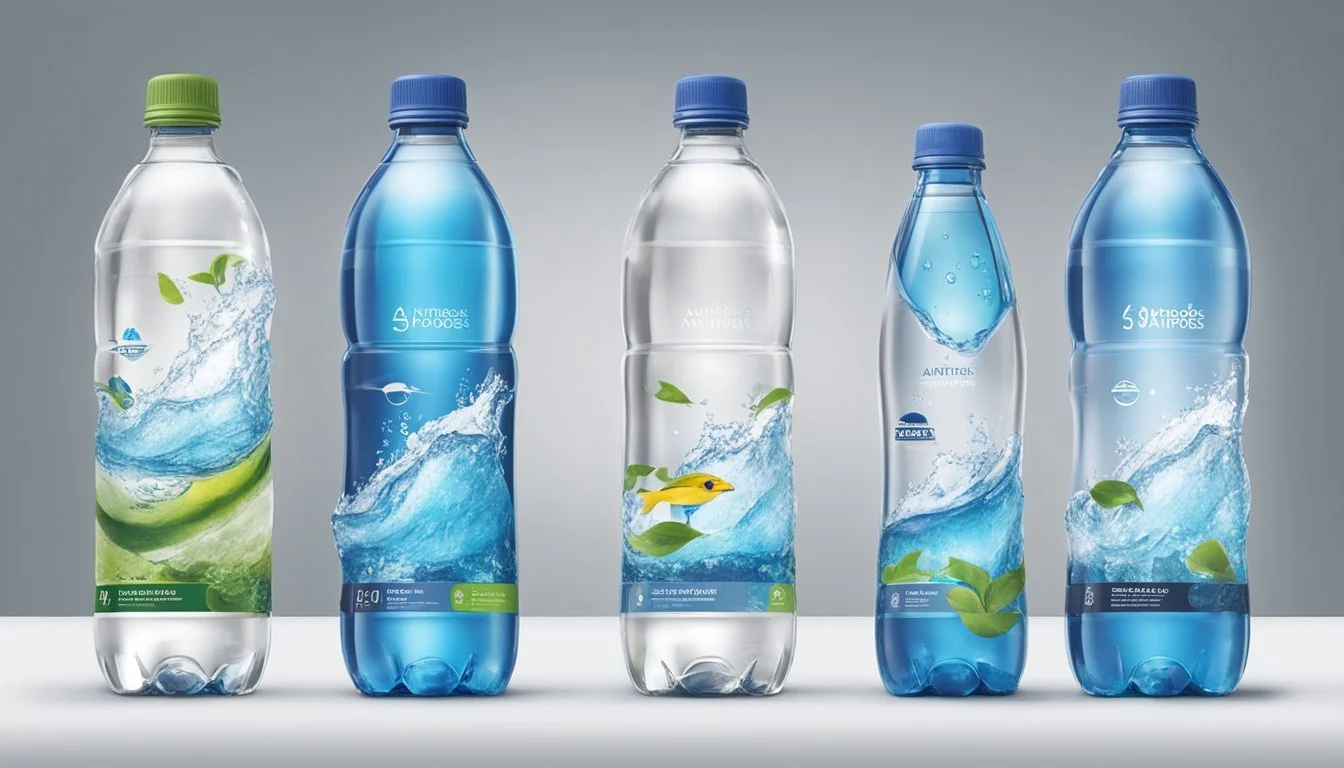Antipodes vs. Proud Source
Comparing Top Bottled Waters
When it comes to selecting premium bottled water, Antipodes and Proud Source are two noteworthy brands that stand out. While both offer high-quality water drawn from pristine sources, they cater to different preferences and needs. Antipodes, sourced from a New Zealand aquifer, is known for its simple, light taste and high price tag, making it a luxury item for bottled water aficionados.
Proud Source, on the other hand, boasts a pH level of 8.1 and a TDS reading of 132 ppm, indicating its rich mineral content, which includes calcium, magnesium, and potassium. This results in a crisp and slightly alkaline taste, ideal for those who prioritize the health benefits of alkaline water.
With these defining characteristics, readers are left to weigh the importance of taste, mineral content, and cost when deciding between Antipodes and Proud Source.
Evolution of Bottled Water
The bottled water industry has undergone significant transformations from its historical roots to the present-day landscape dominated by numerous brands. The following subsections will explore these changes in depth.
Historical Context
The concept of bottled water dates back to ancient civilizations where people valued natural springs for their supposed health benefits. Early examples include the Romans, who sourced and consumed water from mineral springs.
In the 19th century, bottling mineral water became a commercial enterprise. Companies like Apollinaris and Perrier began exporting bottled water globally. These early brands emphasized the purity and health benefits of their products.
By the mid-20th century, bottled water began to shift from a luxury item to a readily available product. Advances in bottling technology and distribution played a key role in this transformation.
Rise of Water Brands
The late 20th century saw a significant increase in bottled water brands. This period marked the rise of both local and international brands, offering a variety of products such as spring water, mineral water, and alkaline water.
Brands like Evian, sourced from the French Alps, emphasized purity and natural sourcing. On the other hand, brands like Dasani and Aquafina, owned by major beverage corporations, focused on accessibility and affordability.
Furthermore, premium brands like Antipodes and Proud Source emerged, catering to niche markets with their emphasis on sustainability and unique water qualities, such as high mineral content or specific pH levels.
Consumer Trends
Consumer preferences in bottled water have evolved considerably. Initially driven by health and purity concerns, the market now diversifies based on lifestyle and environmental considerations.
Spring water and mineral water remain popular due to their natural origins and perceived health benefits. Alkaline water has gained traction among consumers seeking additional health benefits, such as better hydration and acid-base balance.
There is also a growing demand for eco-friendly packaging and sustainable practices. Brands that utilize glass bottles or recyclable materials, like Antipodes, appeal to environmentally conscious consumers.
In conclusion, the bottled water industry has significantly evolved to meet changing consumer demands and preferences over time.
Analyzing Antipodes and Proud Source
Antipodes and Proud Source offer unique qualities in terms of their origins, water sourcing, filtration methods, and environmental impact. Each brand's approach to producing high-quality bottled water reflects a commitment to sustainability and purity.
Brand Origins
Antipodes is a renowned New Zealand brand known for its premium bottled water. Founded in 2003, it quickly gained recognition for its high-quality water sourced from deep aquifers.
Proud Source hails from the United States, specifically from Idaho and Florida. This brand focuses on offering naturally alkaline water with a pH of 8.1. Proud Source emphasizes its commitment to sustainability and transparency.
Water Sourcing
Antipodes sources its water from an ancient aquifer located beneath the Bay of Plenty in New Zealand. This aquifer provides naturally filtered water that is considered among the purest in the world.
Proud Source obtains its water from mountain springs in the Rocky Mountains of Idaho and limestone aquifers in Florida. The water naturally filters through the earth, offering a balanced mineral profile and maintaining high alkalinity.
Filtration Techniques
Antipodes utilizes natural filtration processes provided by its deep aquifer source. The water undergoes minimal processing, ensuring that it retains its natural mineral content and purity.
Proud Source employs a similar philosophy, where the water is naturally filtered by the rocky and limestone layers it passes through. They focus on maintaining the integrity and natural pH of the water without extensive industrial processing.
Environmental Impact
Both brands prioritize environmental sustainability. Antipodes uses glass bottles, reducing plastic waste and encouraging recycling. Their bottling facility is carbon-neutral, emphasizing their commitment to reducing their environmental footprint.
Proud Source also highlights its eco-friendly practices by using 100% recyclable aluminum bottles. Their production process aims to minimize environmental impact, with a strong emphasis on conservation and responsible sourcing.
Chemical and Mineral Content
Examining the chemical and mineral content of bottled water is crucial for understanding its health benefits and potential drawbacks. Here, we'll look at the specific mineral levels and notable chemical properties of Antipodes and Proud Source.
Assessing Mineral Levels
Antipodes and Proud Source contain various essential minerals that can benefit overall health.
Antipodes is known for its high silica content, which can improve skin, hair, and nails. It also has balanced levels of calcium, magnesium, and potassium.
Proud Source also boasts a variety of minerals. Its calcium and magnesium levels are significant, contributing to bone health and muscle function. The potassium content aids in regulating hydration and blood pressure.
The Total Dissolved Solids (TDS) for Proud Source is 132 ppm, reflecting its mineral richness. Antipodes's TDS levels may vary, indicating a balanced mineral content that enhances taste without overloading the body with minerals.
Notable Chemical Properties
When it comes to pH levels, Antipodes is relatively neutral with a pH close to 7. This neutrality makes it neither overly alkaline nor acidic, appealing to those who prefer a balanced taste and potential health benefits.
Proud Source is slightly more alkaline with a pH of 8.1, thanks to the presence of alkaline minerals like calcium and magnesium. This can help neutralize acidity in the body, benefiting individuals with acid reflux.
The absence of harmful contaminants like toxic PFAS chemicals is a critical factor. Both brands maintain rigorous testing standards to ensure their water is free from these and other dangerous chemicals, offering peace of mind to health-conscious consumers.
Health and Hydration
When choosing between Antipodes and Proud Source bottled water, it is crucial to understand how they impact health and hydration. The details discussed will focus on hydration benefits and the role of electrolytes.
Hydration Benefits
Both Antipodes and Proud Source provide essential hydration, but their sources and processing methods vary. Antipodes water is sourced from a New Zealand aquifer, known for its purity and high pH level. A higher pH can reduce acidity in the body, contributing to overall balance. Proud Source emphasizes sustainability with its eco-friendly packaging and naturally alkaline water, which may contribute to better hydration compared to standard bottled water.
Consumers looking for optimal hydration should consider these factors. The higher pH in both waters aids in keeping the body balanced. While the body is efficient at managing pH, having water with a higher pH may provide added benefits.
Electrolytes and Hydration
Electrolytes are crucial for maintaining fluid balance in the body, and both bottled waters contain beneficial electrolytes. Antipodes boasts natural electrolytes like calcium and magnesium, essential for muscle function and hydration. These minerals help the body retain water, enhancing hydration levels.
Proud Source also offers naturally occurring electrolytes, which are beneficial for maintaining hydration, especially during physical activity. Its commitment to natural sourcing ensures that these electrolytes are preserved without artificial enhancements.
Comparing their electrolyte content is essential for those leading active lifestyles, as well-balanced electrolytes help avoid dehydration and support overall physical performance. The presence of these natural minerals in both waters can assist in maintaining optimal hydration levels throughout the day.
Taste Profile Comparison
Antipodes and Proud Source offer distinct taste experiences, influenced by their unique mineral contents and sources. Here we compare their flavor characteristics and consumer taste preferences.
Flavor Characteristics
Antipodes is known for its crisp and clean taste, derived from the deep artesian aquifer in New Zealand. The water is naturally alkaline with a pH level of 7.8, providing a smooth mouthfeel. Its mineral content includes bicarbonate, calcium, and magnesium, which contribute to a subtle sweetness without any bitter aftertaste.
Proud Source originates from a spring in Idaho, USA. This water has a neutral pH of 7.2 and a balanced mineral composition, including calcium and silica. The taste is often described as light, with a slight mineral aftertaste but no noticeable bitterness. It has a smooth texture, making it refreshing for everyday consumption.
Consumer Taste Preferences
Consumers who prefer light and delicate flavors may favor Proud Source due to its subtle mineral notes and smooth finish. It is particularly popular among those who appreciate a clean, pure water taste without overpowering mineral elements.
On the other hand, those who enjoy water with a hint of natural sweetness might lean towards Antipodes. Its higher mineral content, especially bicarbonates, enhances its flavor profile, offering a satisfying drink that leaves no bitter aftertaste.
In taste tests, Antipodes often receives praise for its refreshing and smooth qualities, appealing to individuals looking for a premium hydrating experience. Proud Source is favored for its clean and crisp profile, making it a favorite for those who enjoy a more understated flavor in their bottled water.
Packaging and Sustainability
Both Antipodes and Proud Source make significant efforts in their packaging and sustainability practices, leveraging unique materials and focusing on minimizing environmental impact.
Types of Bottles
Antipodes uses glass bottles for their water, which are recyclable and reusable. However, the production of glass involves a high energy cost.
Proud Source opts for aluminum bottles. Aluminum is lightweight and boasts a high recycling rate. It is easier to recycle compared to glass.
Comparison Table:
Brand Bottle Type Recyclability Antipodes Glass Moderate Proud Source Aluminum High
Environmental Considerations
Glass bottles used by Antipodes require significant energy to produce and transport due to their weight. Despite their eco-friendly image, the carbon footprint of glass can be substantial.
Proud Source’s aluminum bottles are more environmentally friendly. Aluminum has a high recycling rate and produces less waste. Additionally, aluminum is lighter, reducing transportation emissions.
Key Points:
Glass: High energy cost, heavier, moderate recyclability
Aluminum: Lower energy cost, lighter, high recyclability
Consumer Influence on Eco-Friendly Practices
Consumers play a crucial role in driving eco-friendly practices. By choosing products from companies like Antipodes and Proud Source, consumers support sustainable initiatives.
Antipodes focuses on the appeal of reusable, stylish glass bottles which can be refilled multiple times.
Proud Source taps into the eco-conscious market with their infinitely recyclable aluminum bottles. The choice of aluminum also allows them to highlight BPA-free packaging, attracting health-conscious consumers.
Consumers influence the market by prioritizing sustainability and environmentally friendly options. Brands respond by innovating packaging and reducing environmental impact.
Regulations and Safety Standards
The regulation and safety standards for bottled water are essential to ensure that the water consumed is free from contaminants and safe for human health. This section addresses the regulatory frameworks and safety measures for Antipodes and Proud Source bottled water.
Bottled Water Regulations
Bottled water in the United States is regulated by the Food and Drug Administration (FDA), which sets stringent standards to ensure quality and safety.
Similarly, tap water is regulated by the Environmental Protection Agency (EPA), which governs public water systems.
Both Antipodes and Proud Source comply with the FDA's regulations, meaning they must adhere to criteria at least as stringent as those the EPA sets for tap water.
These regulations include limits on contaminants, such as PFAS chemicals, heavy metals, and arsenic. Meeting FDA standards ensures that the water is safe for consumption.
Safety Tests and Certifications
Safety tests are crucial for maintaining the high standards expected from bottled water brands like Antipodes and Proud Source.
Both brands undergo rigorous pH tests to ensure the water maintains an optimal acidity level, contributing to its purity and health benefits.
They also conduct regular testing for various contaminants, including PFAS chemicals and heavy metals, to ensure the absence of harmful substances.
Certifications from recognized bodies further validate their commitment to water quality. Proud Source, for instance, may possess certifications like NSF or IBWA standards, signaling adherence to industry-best practices and safety protocols.
These measures ensure consumers receive high-quality water free from harmful contaminants.
Consumer Guides
For those considering Antipodes and Proud Source bottled water, understanding the key differences in purchasing, taste, and quality is essential. This section examines purchasing tips and a comparative analysis.
Purchasing Advice
When buying bottled water, it's important to consider the source, price, and bottle material. Antipodes offers premium bottled water sourced from a New Zealand aquifer and packaged in tasteful glass bottles, often costing around $7 per liter.
Proud Source water comes in aluminum bottles, promoting sustainability. It sources its water from natural springs and retails for a slightly lower price, often around $5 per liter.
Consumers should also check for pH levels and TDS (Total Dissolved Solids). Antipodes has a balanced mineral content, while Proud Source boasts a pH of 8.1 and TDS of 132 ppm, ideal for those who prefer alkaline water.
Comparative Analysis
Comparing Antipodes and Proud Source reveals differences in taste, environmental impact, and mineral content. Antipodes offers a pure taste with no plastic aftertaste, leveraging its glass bottle to avoid any flavor contamination. Meanwhile, Proud Source's slight tang at the end might not appeal to everyone.
From an environmental perspective, Proud Source's aluminum packaging stands out as more eco-friendly than glass. The alkaline minerals in Proud Source, including calcium, magnesium, and potassium, provide added health benefits. Antipodes, while also mineral-rich, focuses more on purity and a balanced taste profile.
For purity and sleek packaging, Antipodes is a strong contender. For those focused on sustainability and alkaline content, Proud Source has clear advantages.

